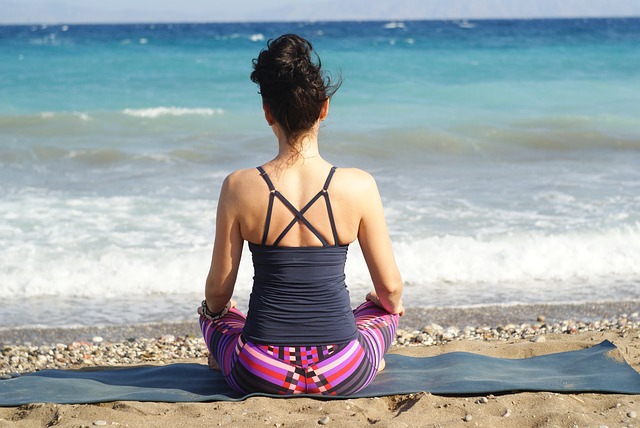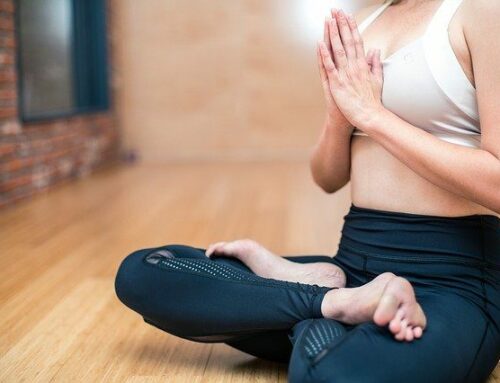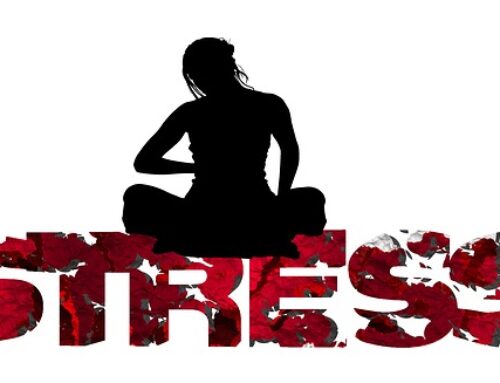
Recommended: 21 Brain Foods That Help Depression And Anxiety
If you’ve been trying to calm your anxious mind with common meditation instructions that you get online and failed, let me assure you that you’re not alone. I’ve noted that many others with anxiety disorder struggled to get meditation practice to work. And I’ve experienced how jumping straight into a meditation session when your mind is highly anxious could actually backfire.
Why It’s Hard To Meditate When You’re In Anxiety?
Before you got more stressed out for failing to calm your mind with meditation, let me tell you this. There is nothing wrong with mindfulness meditation. And there is definitely nothing wrong with you too. It’s just the fact that jumping straight into meditation with an anxious mind will only cause more stress.
Here’s why.
You have to realize that the aim of mindfulness meditation is to train your mind to be attentive to the present. Picture your mind as a monkey that is tied to a pole, and constantly seeking a way to escape. You as the owner of the monkey has to keep dragging it back to the pole.
What happened when you have to keep pulling the monkey back? Of course, you’ll get tired and your muscle will ache. The same happened to your mind in a mindfulness session. You keep bringing back your mind from stray thoughts to your breathing. For normal meditators, you’ll experience fresh, calm but slightly fatigued mind after a meditation session.
The Anxious Mind Is A Super Hyperactive Monkey
Now, picture the mind of someone who has anxiety as a monkey on a hyperactive drug, and the owner already half drained of energy. What are the chances of the owner catching the monkey?
Your guess is as good as mine. The monkey will escape most of the time leaving the owner out of breath.
That is why most people who are having anxiety issues struggled with mindfulness meditation. They try to chase the monkey when they could barely run.
Does this mean mindfulness meditation is not an effective technique for dealing with anxiety?
No.
It is just that most of us with anxiety issue is using meditation the wrong way and practicing at the wrong time. Mindfulness meditation is like asking the brain to go to the gym and lift weights. But you can’t do that when all the energy are already spent on negative thoughts. It’s easy when the brain muscle is strong to start with, else it’s a tough process.
Should You Give Up On Mindfulness Meditation Due To Your Anxiety?
Most people get it wrong by treating mindfulness meditation like a pill to pop in when having an attack. No, that’s not how mindfulness work. When your mind is well trained and mindfulness become a habit, you are aware when obsessive thoughts started pulling your mind into anxiety, and your mind disassociates itself from those thoughts by being attentive to the present.
Mindfulness meditation is not your magic pill.
It is a practice that you need to cultivate long term for it to be useful against anxiety. While normal people could meditate anytime without much difficulty, people who are having anxiety issues need to create the right condition to meditate. And the right condition is the mind being calmed and relax to a certain extent before you start meditating.
It’s like solving a short term problem in order to build a long-term solution.
How To Meditate With Anxiety
1. Relaxation Exercise
I find it hard to relax mentally if my body is tensed with stress. I normally do a full body stretching, plank, and sit-ups just to get some sweat out. It’s a common knowledge that working out produce dopamine in our brain that lifts our mood.
There are also studies that suggest people who exercise regularly have less risk of suffering from anxiety issues. It is not really surprising as exercising actually reduces cortisol, a stress hormone in our system.
The question is how long should we workout to see a reduction in anxiety symptoms. Psychologists suggested that 10 minutes of working out may produce the result of a longer 45 minutes session.
2. Shower
Taking a shower is also known to provide a relaxing effect on our body. I’ve seen articles that suggest either a cold bath or a warm shower. If you’re undecided on what actually works, here’s the answer.
Both cold and warm shower works for relaxation. But cold shower works best when it comes to treating anxiety and depression. In this article that discussed the extensive use of bath in hydrotherapy, cold shower reduces the temperature of the brain and that leads to therapeutic and neuroprotective effect.
Studies also suggested that cold shower could relieve inflammation, a symptom often associated with anxiety and depression and also produces feel-good hormones.
3. Relaxing Meditation Music
It has been proven that certain types of music could reduce stress and anxiety level. The genre of the music; the harmony, tempo, and melody that builds up the piece affect the listener’s mood. Music therapy is not new, in fact, you may have already been doing that by plugging your favorite piece when you are stressed out.
There is also a technology called binaural beat, where the music is altered to tune your brainwave into different frequencies. Some resonate your brainwave into Alpha waves for calm and relaxation. While Theta binaural beats turn your mind into sleep mode.
There are of course skeptics on this form of technology. But my experience with it has proven that it is effective. You can get hundreds of them for free on Youtube. But if you wanted to be really sure, check out some samples from my favorite relaxing music site.
4. Hypnosis
If you listened to the right hypnosis, you will feel relaxed mentally and physically after you wake up from the hypnotized state. Perhaps “wake up” may not be the correct term, because you never lose consciousness or fell asleep in the whole hypnosis process.
Contrary to what most people believe on hypnosis, (swinging clock watch and losing your mind) as what you watch on TV, Hypnosis is anything but letting go of all controls on your mind. Instead, hypnosis puts you into a hyperattentive state, where you’re calm and focused as directed by the hypnotist’s voice.
When you meditate, it took a while before you see an improvement in your thought habits and your ability to cope with anxiety. But a professionally produced hypnosis audio could bring positive effect immediately as soon as you opened your eyes. In order to be hypnotized, you need to be able to relax and focus, where relaxing meditation music will help.
I have benefited greatly from using hypnosis to overcome my social anxiety and depression. Read my full story here.
5. Meditate
Why do you need mindfulness meditation, when hypnosis appeared effective in overcoming anxiety? Because it’s a good self-applicable technique to have when you’re overwhelmed by negative thoughts.
You can’t pop up your earphone and play hypnosis track when you’re at work, or when you’re having a conversation. It’s hard to be hypnotized when you’re having your meal and anxiety struck. But the mindfulness skill you gained from the diligent practice of meditation became second nature to you and could help you remain calm while dealing with anxiety.
You can’t stop negative thoughts from arising. But you can detach emotional response to such thoughts. Thoughts are meaningless unless we gave them one. When you heard a negative conversation, it could be just “sound” instead of “how dare they belittle me” that cause your mind to race all over.
The Simple Steps Of Mindfulness Meditation
- Sit in a relaxed posture with your spine straight. It doesn’t matter if it’s full-lotus, Burmese or a simple cross-legged position.
- Close your eyes.
- Inhale naturally and be aware of the sensation of the inhalation.
- Exhale naturally and be aware of what you feel.
- When you find your thoughts wander away from your breathing, gently bring it back, and label it as ‘thoughts’ or ‘thinking’.
It’s really a simple technique. The complicated part is the nature of our monkey mind that is ever restless. Do not attempt to suppress thoughts from your mind. It is just impossible. The goal of meditation is not to empty your mind of all thoughts. But to learn how to be at peace with them. Read more here.
I’ve also written on how long should you meditate before you see some real results here.
I hope this article gives you a clear direction on how to meditate with anxiety. Do share it with others if you think it’s helpful.
Read My Experience With Aware, A Meditation App Geared Towards People With Anxiety
Do you face difficulties in calming your mind with meditation when anxiety strikes? What have you tried to relax your mind? Do share your thoughts here as it may help other readers as well.
Related :
21 Brain Foods That Help Depression And Anxiety
Hypnosis For Social Anxiety – Overcome Social Phobia Review
How To Overcome Depression Naturally
Why You Should Start Meditation Practice Before Life Hits You Hard







I love your article, and something I always have on my to-do list, but never seem to get around to it, simply because the worrying does tend to make the mind a little to noisy, making it difficult to quieten – but I do believe it could be very beneficial to one’s state. I’m definitely going to try it out with your suggestions of exercise, shower and music … the more I practice the better it will get right.
Hi Laurie,
Hope it helps to calm your mind.
Cheers,
Kenny
I have generalized panic disorder and this hits home in so many ways. I love your “Super Hyperactive Monkey” analogy, I feel like I need to refer a few people to read that who don’t understand the state of mind we go through. We can’t just flick a switch and turn it off. Really great tips, and I agree that many people get the wrong idea about hypnosis. Anxiety is a horrible thing to live with and I’m always looking for new ways to combat it. Great information, thank you.
Hi Jen,
I hope you have found ways to cope with your panic disorder. It’s hard for people to understand when they are not going through it. Thanks for sharing your thoughts here.
Cheers,
Kenny
One who suffers from anxiety and its related issues is always on the lookout for a lifeline which will provide some relief and mostly it is prescription drugs. I am glad to see such a detailed and beautifully written article on how to manage anxiety with meditation. Of course if one is mindful and present in this moment there is no cause for anxiety.
Hi Tushar,
Thanks for reading and sharing your view.
Cheers,
Kenny
Hey Kenny, love your article, very interesting and informative. I didn’t know a cold shower was a good method of relaxation, I always tried breathing or listening to relaxing music. This is definitely something I will try next time I want to meditate or try to relax when I have anxiety, thank you.
Hi Victor,
Thanks for reading. Cold shower is quite refreshing for me.
Cheers,
Kenny.
Thank you for the wonderful information. I’ve had social anxiety my whole adult life and you’ve laid out some great tools and techniques that I will definitely try.
Viewing it as a hyperactive monkey mind is really clever and helpful. 🙂 And, the link to the 21 brain foods that help anxiety is brilliant. Thank you!!
Hi Vic,
Thanks for reading and I know how having social anxiety for years felt.
Hope it helps.
Cheers,
Kenny